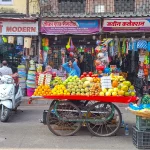Tag Archives: india
Mumbai (cont’d)
Coexisting with India’s bureaucracy, as every Indian would surely agree, is not an easy thing. For foreigners this is compounded by the country’s paranoia over security issues. This time I have been working with two problems: the online purchase of train tickets and of an Indian SIM card, both of which proved tiresome and ended in failure though I’ve managed many times in the past. Yet from year to year the rules grow more complicated, and procedures that with infinite time and patience could be expected to work ultimately end in failure. For now I have given up on both counts. I am using a SIM from home, and there are other ways to buy train tickets, of course.
More photos
India
I arrived in India on December 26, after buying a flight on Kiwi.com that transferred me through Dubai. As far as I checked, only they offered this connection, because it was not formally a connection, but two separate and distinct flights. I had to go through Dubai’s passport control. But this was fairly easy, and the 3.5 hour layover proved to be plenty of time to get through immigration and change terminals. Still, if the airport had been busier, perhaps the process would not have been quite so relaxed.
Entering Mumbai was also easy to negotiate. G had given me precise instructions on reaching his friend’s apartment and a black-and-yellow taxi (the cheapest kind – avoid the expensive alternatives) took me there, over the new Sea Link route (for which you must pay the toll). The apartment is in one of the old houses on a side street not far from the Taj Mahal hotel and the Regal Cinema. It is high-ceilinged and graced by old-style or antique furniture – it’s been a while since I have slept in a semi poster bed.
Walking around the next day, it took me a couple of hours to get used again to the comparative squalor of Indian city streets. But I quickly got over that, so that it seems normal again.
My flights required me to travel light this time. Kiwi said that I was formally limited to one 5 kg bag, though I had realized that was probably not true. Spicejet’s limit for cabin luggage is 7 kg, and I made sure to stay within that. Actually it was borderline, but I placed some of the heavier items in my travel vest, which wasn’t weighed, and they also did not weigh the laptop bag. So my backpack registered as 5 kg and the man said “perfect”. However, due to the need to travel light, I left my camera at home and will rely upon my cellphone. Still, looking at my travel vest, the Indian airport immigration officer asked if I was a photographer. They are so so afraid of journalists in this country. I laughed at his suggestion that this was a photographer’s vest and said I was actually here for meditation. If he had pressed, I could have pointed out that I wasn’t even carrying a camera.
I have been walking around the area of the old Fort district, after reading a couple of books I found in my room on walking tours of Bombay’s historical area. Basically, there are many old buildings, most in a sad state of disrepair. But still a lot of history. I was particularly fascinated by St. Thomas Cathedral, with its many markers and plaques concerning British colonial officers cut down by attacks, overexposure to the sun, and probably disease, though the latter isn’t mentioned so often. One of the plaques even commemorates a member of the Scott expedition to Antarctica.
National self-harm
I watched the 2nd part of the BBC’s The Modi Question, heard a discussion with a historian of modern India, on The Wire, and watched the Israeli TV news. Israel’s turn to the right has many of the same characteristics … Continue reading →
Earl Grey tea
I was making Earl Grey with the quantity needed for milk tea, so it came out too bitter. Just a flat teaspoon, then three or four minutes brewing time, is enough. I still add half a teaspoon of sugar. But … Continue reading →
Saturday
On Saturday morning I fixed a few broken items with epoxy glue, but not a pair of shoes, whose sole has become partly detached. From watching a couple of YouTube videos, it looks like it will be better to buy … Continue reading →
Kfar Hittim
Went up to the Sea of Galilee with the family, staying in Kfar Hittim, in the large house of an Israeli-Indian couple who seem to spend most of their time in India. We were 12; 8 adults and four kids. … Continue reading →
India’s independence day
Just as it’s hard to think of Israel’s independence day without remembering the Nakba, it’s impossible to think of India’s independence day without remembering Partition. Although it took place 75 years ago, the news media have still been able to … Continue reading →
Website work, thoughts about India
I spent most of the day working on the Israeli Thich Nhat Hanh sangha site, mindfulness-israel.org. It’s completely voluntary but I enjoy it and it feels useful. This is a WordPress site with the flexible Weaver theme, which sometimes frustrates … Continue reading →
Still in Kochi
Still enjoying Fort Kochi, a town that is inherently interesting and enjoyable. Perhaps too many tourists, though thanks to them there are so many guest houses, restaurants and cafes. You can’t have it all ways. But the kind of tourists … Continue reading →


